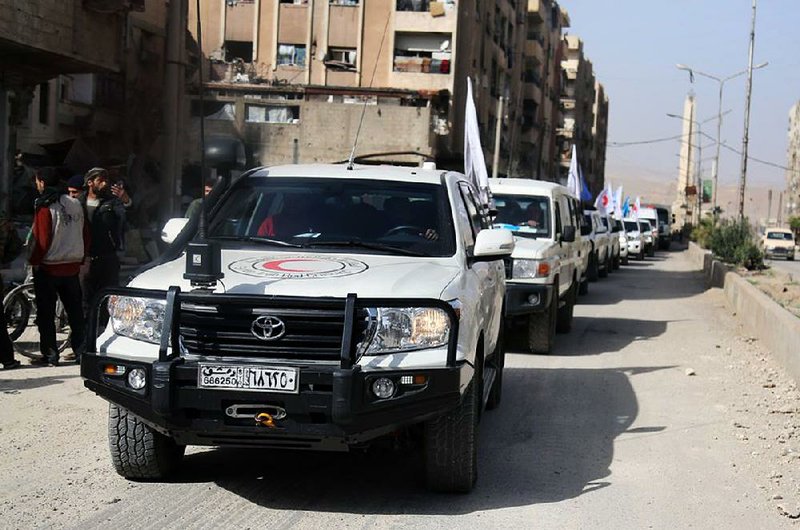A United Nations convoy carrying desperately needed food and medicine to besieged civilians entered the war-ravaged eastern suburbs of Damascus on Monday, but aid agencies said Syrian authorities blocked the delivery of some of the health supplies, including trauma and surgical kits and insulin.
The shipment was the first to enter eastern Ghouta since Russia instituted what it called daily "humanitarian pauses" in the fighting a week ago. It also was the first time in weeks that any aid has been allowed in amid a crippling siege and a government assault that has killed hundreds of people in the past month.
Despite the truce, at least 50 civilians were killed Monday in airstrikes and shelling, according to the Britain-based Syrian Observatory for Human Rights monitoring group. The activist-run Ghouta Media Center said 24 people were killed in Hammouriyeh and another 10 in Harasta, both towns in eastern Ghouta.
The U.N.'s humanitarian office said the 46-truck convoy of health and nutrition supplies, along with food for 27,500 people, entered Douma -- the largest town in eastern Ghouta -- around midday.
[THE ISLAMIC STATE: Timeline of group’s rise, fall; details on campaign to fight it]
But it said the Syrian government did not allow 70 percent of the health supplies to be loaded and would not allow them to be replaced by other items.
The World Health Organization said that, during an obligatory routine inspection by Syrian national authorities, many of the supplies in the group's shipment were rejected, including all trauma, surgical, dialysis and insulin supplies.
The government routinely removes lifesaving medical supplies from aid convoys. U.N. officials have complained for years about such actions by the Syrian government.
Eastern Ghouta, home to about 400,000 people and one of the last rebel strongholds near the capital, has been under a crippling siege and daily bombardment for months. More than 700 civilians have been killed in the past two weeks alone.
Douma-based media activist Ahmad Khansour said there is "tremendous reproach" against the U.N. and the international community in eastern Ghouta.
Khansour said the aid covers 7 percent of the people in need.
"Can you imagine such a number? It means if we divide it evenly, each family gets [about 4.5 pounds]. It's enough for one day. It's unbelievable how shameful this is of the U.N.," he added.
The U.N.'s Resident and Humanitarian Coordinator in Syria, Ali al-Za'tari, said the aid was delivered to civilian groups and local councils, in coordination with the Syrian Arab Red Crescent. Military groups did not receive any supplies, he said.
Ingy Sedky, a spokesman for the International Committee of the Red Cross in Damascus, said the aid delivery was a "first positive step" that would lessen the suffering of the civilians.
"However, more needs to be done in the coming period," she added. "A one-time aid delivery will never be enough to fulfill the needs."
The only other U.N. aid delivery to eastern Ghouta this year was on Feb. 14, when a convoy of supplies for 7,200 people reached Nashabiyah, a smaller town.
The Assad government, meanwhile, said it achieved "significant" progress in its ongoing military operation in eastern Ghouta, seizing about 36 percent of the total area held by different armed groups.
Syria's Central Military Media said troops continued advancing from the east and were only 1.8 miles from meeting up with troops coming from the west, which would cut eastern Ghouta into two parts.
In Geneva, the U.N.'s top human rights body called for investigators to conduct an urgent and targeted probe of the violence in eastern Ghouta.
The Pentagon on Monday said offensive operations against Islamic State fighters in eastern Syria were paused because U.S.-backed Kurdish soldiers have shifted to a separate fight against Turkish forces. Turkish forces have been attacking in Afrin in Northwest Syria for the past six weeks, seeking to drive out Kurdish forces.
A Pentagon spokesman, Col. Rob Manning, called it an "operational pause." He said that although ground operations have been temporarily suspended in the Euphrates River Valley near the Iraqi border, U.S. airstrikes against Islamic State holdouts in that area are continuing.
Information for this article was contributed by Jamey Keaten, Edith M. Lederer, Philip Issa and Robert Burns of The Associated Press.
A Section on 03/06/2018
